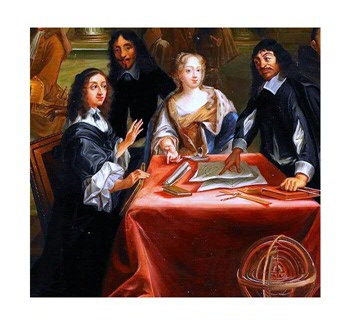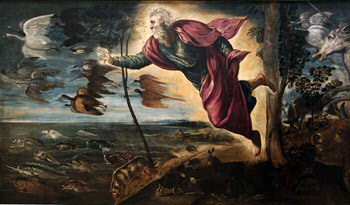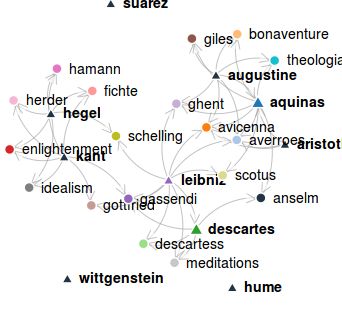Andrea Sangiacomo
The normalisation of natural philosophy
How teaching practices shaped the evolution of early modern science
(ERC Starting Grant 2019-2024)

Early modern natural philosophy underwent dramatic transformations that completely reshaped its conceptual framework and set of practices. The main contention of this ERC project is that teaching practices had a decisive and ‘normalising’ impact on the progressive dissemination, adaptation and selection of rival conceptions of natural philosophy. Normalisation occurs when historical actors collectively present certain tenets as crucial for the study of a discipline, and thus prescribe them as a necessary subject for teaching and learning.
The overall aim of this ERC project is to determine and explain how the process of normalisation embedded in teaching practices shaped the evolution of early modern natural philosophy. To study normalisation, it is necessary to operate a systematic comparative investigation of hundreds of works through which natural philosophy was taught, learned and reshaped, both within and outside universities. The size of this corpus defies the traditional method of close reading used by historians of philosophy and science.
The project will meet this challenge by organically integrating close reading with digital ‘distant reading’. During the project, we will digitally transcribe a corpus of approximately 500 early modern works on natural philosophy, published in Britain, France and the Dutch Republic. Using digital tools to investigate how the networks of authors and concepts of natural philosophy co-evolved over time will allow the team project to identify textual excerpts that are representative of historical trends. By analysing these excerpts with close reading and assessing them against the digital results, it will be possible to determine and explain how normalisation shaped the evolution of natural philosophy.
This project will boost the integration of digital approaches in the history of philosophy and science by producing a newly digitised corpus, tools customized for analysing early modern texts, and methodological reflections on their implementation.
Occasionalism and the secularization of early modern science
Understanding the dismissal of divine action during the scientific revolution
(NWO - Veni scheme, 2015-2019)

At the beginning of the seventeenth century, the claim that God actively participates in the production of natural phenomena was an integral part of the new worldview emerging from the scientific revolution. However, during the eighteenth century natural philosophers progressively dismissed this reliance on divine action. The reasons for this dramatic change remain unclear, even though they shaped the process of secularization of early modern science. The question to be investigated in this project then is: Why – and how – did the theology-based science of the seventeenth century turn into an apparently theology-free science a century later?
My project addresses this issue by focusing on the neglected impact on the scientific debate of the account of divine action proposed by the “occasionalists”, so called because they held the extreme view that God is the only cause that ‘acts’ on the ‘occasion’ of every natural phenomenon.
I will investigate how the secularization of early modern science was fostered by the reactions of several natural philosophers to the “occasionalist” claim that God is constantly operating in nature.
The project will explore (1) how occasionalist arguments were integrated into scientific textbooks of the time, such as those proposed by Antoine Le Grand and Christoph Sturm in England and Germany respectively; and (2) how the new accounts of force and active matter developed to reject these arguments led natural philosophers to drop the discussion about God’s participation in the production of natural phenomena from the scientific agenda.
Beyond the field of history of philosophy and science, this Veni project will provide the historical background necessary to avoid misrepresentations of occasionalism within today’s discussion on divine action. Moreover, it will contribute to the debate on science and religion by highlighting how religious concerns impacted the development of educational programs during the scientific revolution.

Rewriting Nature: studying the early modern scientific vocabulary in the Republic of Letters with word2vec (RUG ICT data science competition, 2017-2018)
Studying the transformation of early modern natural philosophy in its actual historical complexity is a major challenge for historians of philosophy and science. The size of the historical corpus that should be taken into account to fully address this challenge is hardly treatable with traditional close reading of a few selected texts. In this project, I plan to adapt a word2vec tool, ShiCo , to study the transformation of the conceptual vocabulary of natural philosophy across time. I plan to adapt ShiCo to work on an early modern corpus of learned correspondences (available through the Oxford E-Enlightenment project). ShiCo will allow historians to uncover the patterns in the dramatic transformation that the discipline underwent during the period. I will rework ShiCo in order to introduce a metadata filtering system capable of distinguishing different sub-classes of data and explore what is the minimum size of data sets with which ShiCo can work. This will allow ShiCo to be customized for the specific kind of corpora often studied by historians of philosophy and science. Moreover, I will experiment how Shico can deal with the kind of relatively rare technical terminology that is most relevant for the philosophical discussion.
| Last modified: | 17 March 2020 3.11 p.m. |
